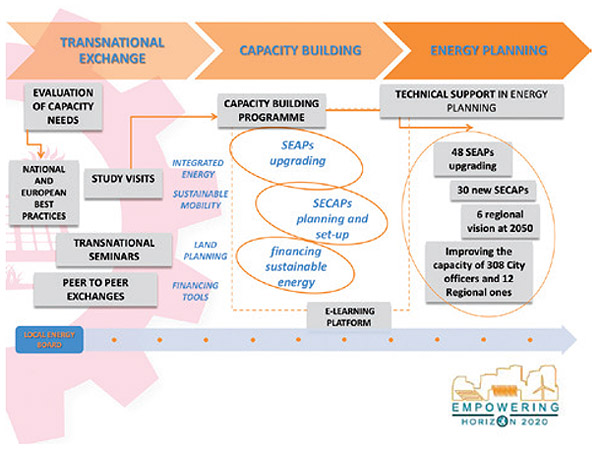Cities play a key role in fighting against climate change. Local authorities have the power to influence climate issues, however often lack the capacity to recognise challenges, opportunities and deliver solution. This is particularly true for small- and medium sized local authorities which face several challenges when it comes to energy planning and implementation. In their case the coordination and support is definitely needed.
Three years ago different authorities – regional development agencies, regions, research institutes – from 6 EU regions (from Italy, Spain, Romania, Croatia, Hungary and Greece) decided to empower local and regional authorities (policy makers and public officers) of each region involved to shape sustainable energy plans coherent with the European climate and energy policies. The initiative received funding from the HORIZON 2020 Programme, which is the most important financial instrument to support research and innovation in the European Union.
THE CONCEPT
The main idea was to involve local municipalities and regional authorities in a sound transnational exchange and learning activities. The capacity building measures supposed to target organisational development and human resources as well.
The transnational exchange programme is designed to enable policy makers and public officers involved to learn from each other’s experiences and adapt effective responses to the major energy challenges with the thematic focus on integrated energy, sustainable urban mobility, land use planning and innovative financial solution. Based on the transnational exchange a capacity building programme is elaborated. As the result of a successfully implemented capacity building program, the improved knowledge and competences of local authorities are put into practice during the adaption of new Sustainable Energy Action Plans and upgrading of the existing ones, while regional authorities are supported in shaping regional energy vision to 2050.

CAPACITY BUILDING NEEDS ANALYSIS
To find the right pathway for the most suitable capacity building program, a survey was conducted in all the six participating regions. The involved local authorities were smaller and therefore have potentially limited capacity, although have motivation to plan and influence energy consumption. The data was collected from 61 local authorities using a structured questionnaire. It was also followed by personal meetings where targeted questions were asked from the participants. Although the results were analysed in all regions separately, similarities within the participating regions could be discovered.
CONCLUSIONS
Available funding influences the implemented measures.
Most local authorities realize exemplary practices in areas related to land use planning where internal structures and institutional settings (procedures) coherently exist. This could be a consequence of the fact that these structures are related to urban planning as an overall concept, however in most cases these structures do not have a focus on sustainable energy. Still, among the topics to be the subject of capacity building activities, "land use planning" scored the lowest preference (46%).
Regarding innovative financing solutions, most respondents scored the lowest level of structural approach – there are gaps on most aspects envisaged (projects, structure, settings, training, resources) and this is confirmed by their preference (of 81%) to be trained on the topic of financial innovative solutions.
More information and related materials are available on the website: http://www.empowering-project.eu/en/